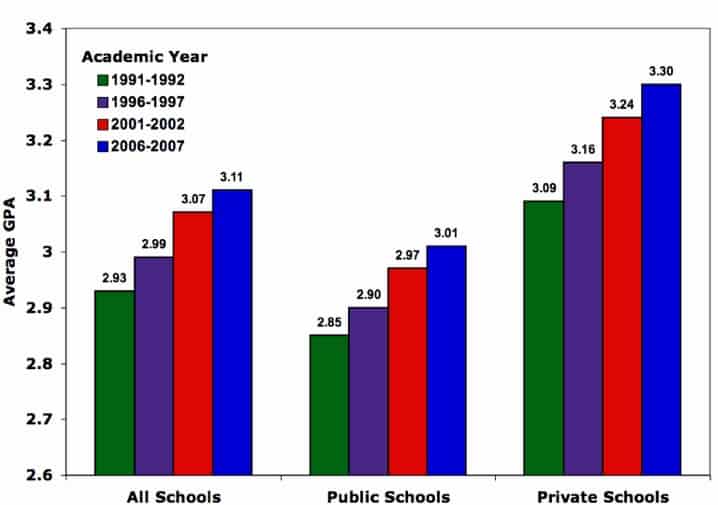Are college students getting smarter?
If you looked at the grades they are “earning,” you might assume the answer is yes. The average GPA in college is 3.1. At private schools, the norm is a 3.3 GPA. In contrast, the typical college student had an average GPA of 2.52 in the 1950s. (That’s just about the GPA that my dad, an engineering major, graduated with in the 50s.)
In nearly every decade, the GPA has inched up. Clearly grade inflation is at play, suggests Stuart Rojstaczer, a retired Duke University professor, who is the guru of grade inflation research.
You can see tons of Rojstaczer’s grade inflation evidence at his website – GradeInflation.com.
This will probably surprise you, but students who attend Ivy League institutions benefit from some of the easiest grading policies in the nation. At some of the most elite schools the average GPA is 3.5 or even 3.6. At Brown University, two thirds of the grades are A’s!
In contrast, students who attend public commuter schools and engineering schools get graded most harshly.
The brutal grading of students in the STEM majors (science, technology, engineering and math) help explain why most students who start out in these majors eventually switch to easier ones. I’ve read a lot of stories and reports about this unfortunate phenomenon, including an article yesterday in The Wall Street Journal: Generation Jobless: Students Pick Easier Majors Despite Less Pay.
Average College GPAs
In the chart below, which comes from GradeInflation.com, you can see how average GPAs have been creeping up since the early 1990s:
3 reasons for college grade inflation:
1. At expensive private schools like the Ivies, students and their parents expect high grades to match these institutions’ high price tags. One notable exception is Princeton University, which has been trying to combat grade inflation.
2. Professors don’t want to jeopardize students’ chances for graduate school and jobs after those fun college years are over.
3. Professors can be cowed by the teacher evaluation forms that students complete. No teacher wants a terrible rating on RateMyProfessors.com, it could impact their chances for tenure.
Universities With the Toughest Grading
About a year ago, I wrote an article that listed the schools where it’s toughest to get good grades including MIT, Boston University, Reed College, Harvey Mudd, Purdue University, Auburn University and California State University-Fullerton. Here is the post:
Grade Inflation: Colleges With the Easiest and Hardest Grades
If you have thoughts about grade inflation, please share them in the comment box below.
Lynn O’Shaughnessy is the author of Shrinking the Cost of College, a financial workbook that can help you make a college degree more affordable. Here’s where you can buy her money-saving workbook.


Stay the hell away from University of Texas! They ruined my future…
Are u talking about UT Austin? what happened?
Why is it so hard to pass at Georgia Tech? Honors students in high school fail miserably. The suicide rate is scary. What do you see as the problem?
Grades are as good of an indicator of a students success as ones height is to their race; There is an extremely week and ambiguous correlation. The fact is, the American pedagogy is marginally adequate for student who’s intellectual capacity are near the mean, however it punishes students who’s intellect is far above. Einstein is the most notably famous example whose intellectual capacity was far above what the pedagogy was capable of evaluating and fostering. I wonder how many more Einsteins we would have if our educational system didn’t group those far above the mean with those far below.
Brendan, I love your observation about Einstein. It also makes me wonder how many Einstein’s got away thanks to our educational system!
Lynn O’Shaughnessy